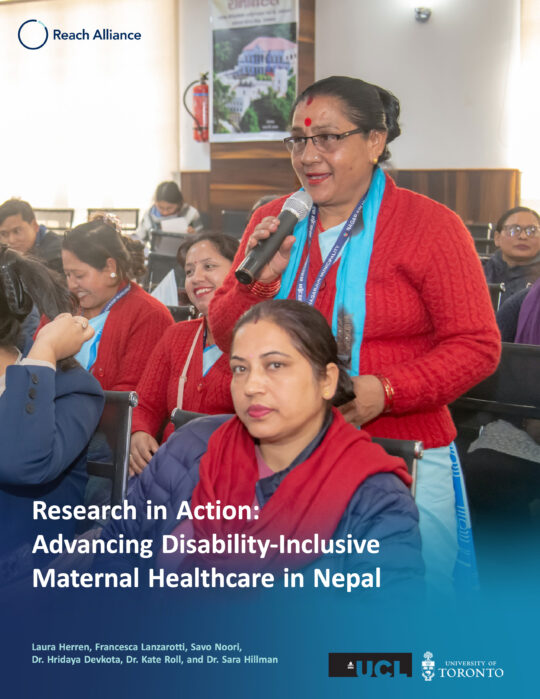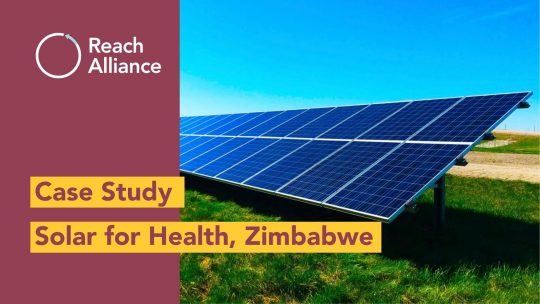Executive Summary
In most major health facilities, electricity is rarely an issue when women give birth, but that is not the case in Zimbabwe. Because electricity is unstable, especially in rural communities, those in labour are given care without stable lighting or reliable equipment. Inequities in access to electricity in health care beg the question: how can we allow individuals to be treated in the dark?
With support from the United Nations Development Program (UNDP) and the Global Fund, the government of Zimbabwe has made great strides in addressing harsh inequities by implementing the Solar for Health project. Beginning in 2015, partners solicited support from privately owned solar panel companies, and in collaboration with local engineers, these panels were installed at Zimbabwean health facilities. As of 2020, 405 health facilities now receive electricity through solar energy to power their daily activities. Considering communities have relied on unreliable sources like coal, it is remarkable many areas now have access to clean energy from an unwavering source like the sun. For over half of Zimbabwean households that live in rural settings, this is life changing.
Partnerships have been crucial for educating communities on how to use solar panels appropriately.
Rural Access to Electricity in Zimbabwe
The availability of reliable electricity to power medical equipment is imperative for the proper functioning of health facilities.1 Apart from clinics’ need for diagnosis and treating and monitoring patients, electricity powers basic functions such as security, temperature regulation and light.2 Despite this, a World Health Organization review found that roughly four in ten health facilities in sub-Saharan Africa lacked access to a reliable source of electricity, and a further 25 per cent had no access at all.3 In Southern Africa, Zimbabwe is emblematic of this problem where, according to data compiled by the World Bank, around only 40 per cent of the country’s population has access to electricity.4 The country also faces extreme inequity: rural electrification rates are estimated at 20 per cent compared to 85 per cent in urban centres.5 Given that two thirds of the population reside in the countryside, lack of electricity exacts a heavily disproportionate toll on rural health clinics.
As with other former British colonies, Zimbabwe’s electricity network was created during colonial times to service predominantly affluent areas, along with industrial and commercial areas. Power production involves mostly a combination of coal and renewable resources. Recent technological developments, as well as population shifts arising from rapid urbanization, have led to expansion of these low-voltage systems without complementary upgrades in the core power-generating system.6 While electricity production is impeded by aging equipment, its distribution also incurs high losses in power because of load shedding from the use of ancient and thin wiring. This poses issues with efficiency, safety and reliability.
Today, the shortcomings in the country’s grid place a tremendous strain on rural health facilities where reliable electricity is needed for surgical interventions and to maintain information and communication technologies (ICTs). Although the advent of digital health has allowed ICTs to play a vital role in the delivery of high-quality care using patient information, the unreliable off-grid network poses a hurdle for healthcare centres to handle information, link with other health systems and synthesize patient data. Access to electricity underpins a facility’s ability to deliver health care. Unfortunately for rural health facilities in Zimbabwe, electricity supply is greatly constrained by infrastructural constraints.
The Solar for Health Project
Solar electrification is widely seen as an important tool in the global effort to mitigate the impacts of climate change and pave a way for sustainable development. However, solar power’s widescale use in remote, energy-poor areas such as rural Zimbabwe has long proven elusive for investors and implementers because it presents unique challenges in resource management, supply chains and organizational systems. As recently as 2016, Bill Gates argued that solar power is not in fact the energy solution the developing world needs and suggested that more efficient electrification and energy storage proposals are necessary. However, solar photovoltaics still have tremendous potential to alleviate energy constraints, especially in the context of Africa, which has seven of the ten sunniest countries in the world. Contrary to initiatives of the past that failed, the Solar for Health (S4H) project was uniquely successful in achieving electrification goals in Zimbabwe.
Spearheaded by the UNDP in 2015, S4H was launched to outfit the country’s off-grid rural health centres with solar systems to help power their everyday activities. These systems are supplied and installed through partnerships set up by the Ministry of Health, local communities and solar module suppliers. The beneficiaries are primary healthcare centres, medical laboratories, district hospitals, polyclinics (clinics with multiple specialists) and storage facilities.
As a result of the initiative, the UNDP Regional Services Centre for Africa estimates that over 34 million people in 12 countries now have access to health centres with reliable electricity. At the beginning of 2020, Zimbabwe reported reaching 405 healthcare facilities, spanning 10 provinces. Compared to other nations, it has been the most successful in reaching the highest number of health centres.
Figure 1. Solar for Health from initial bids to installation and evaluation.
Finances
The Global Fund to Fight AIDS, Tuberculosis, and Malaria funded the S4H program. The project’s sponsor, UNDP, made the link between solar electrification of healthcare centres and the elimination of AIDS and Malaria in Zimbabwe.
Program managers at the organization posited that access to renewable energy would provide health care to members of marginalized communities that previously lacked it. By funding the program, the Global Fund would also promote action on four United Nations Sustainable Development Goals (SDGs): SDGs 3, 7, 13, and 17, which are Good Health and Well-Being, Affordable and Clean Energy, Climate Action and Partnerships for the SDGs respectively. By making the case for action on the SDGs, the UNDP received an initial investment / contribution of USD 5 million from the Global Fund and another USD 5 million after successful project implementation.
Stakeholders: Project Governance and Accountability
As the initiative’s lead organization, the UNDP manages the Solar for Health Program’s financing and operations and it coordinates procurement and implementation among stakeholders, including the Ministry of Health in Zimbabwe, the Global Fund, suppliers of solar systems and local subcontractors.
The sequence of events for any given S4H installation starts with the UNDP soliciting bids from photovoltaics (PV) suppliers based in Africa, Asia, Europe and the Middle East. These suppliers are required to work with a local subcontractor in Zimbabwe who will manage installation and ongoing maintenance of the PV systems. Each supplier contract is exclusive to health facilities from a particular region. Because the Ministry of Health is most familiar with the local context, it selects the participating facilities. Local subcontractors assess those selected to determine the wiring and technical capabilities of their existing electrical systems. The UNDP uses these assessments to request solar panel systems suited to the facility’s needs from the contracted manufacturer. These systems range from photovoltaic kits for basic needs to complex photovoltaic plants for hospitals.
Supply, Transport and Installation
Once local health centres are assessed, context-specific solar panel requirements are communicated to the UNDP which then communicates with manufacturers abroad. The manufacturers work with their local subcontractors to transport the solar panels to each health centre where they are installed. This process involves particular attention to the installation of new wiring in rural centres that lack existing electrical grids. After the installation process is completed, the UNDP releases funds to the primary contractor.
Evaluation
Solar panels at each health centre undergo regular maintenance by the local subcontractors. A critical part of this routine is troubleshooting undertaken by the UNDP and Ministry of Health. All installed PV systems can be monitored remotely by both the UNDP and Ministry of Health. If any technical issues arise, such as insufficient power generation by a set of installed panels, the UNDP informs the Ministry of Health about the specific flaw. Through their own remote monitoring the ministry then confirms the problem and communicates the issue to the manufacturer who informs their local subcontractors who dispatch a repair team to the site. Manufacturers replace panels within a year of installation in accordance with their warranty agreements with the UNDP.
Did Solar for Health Work?
While there is significant literature devoted to the methodologies and procedures for establishing solar electrification systems for rural communities, there is little evidence for their success on a wide scale. Of the many solar electrification programs that have been implemented in developing countries, only a few appear to have been successful and sustainable in benefiting underserved communities.7 To evaluate the success of the Solar for Health (S4H) initiative in serving hard-to-reach populations, we created the “Reach Index” to assess the communities served by S4H clinics. Our index is made up of demographic metrics and these communities’ social determinants of health (SDH). All data gathered on clinics in Zimbabwe, including S4H clinics, were collected in collaboration with Gertrude Bvinidi, a field researcher from the Consumer Feedback Consultancy (CFA) based in Harare.
In recent history, the public health community’s attention has been drawn to SDH — which the World Health Organization (WHO) defines as “the conditions in which people are born, grow, live, work and age” and “the fundamental drivers of these conditions.”8 The UN argues that access to health care may not be sufficient in predicting sustained improvements in health outcomes in Sub-Saharan Africa.
Instead, health analytics should maintain a holistic focus by using SDH. We outline the rationale behind each of the four metrics used in our reach index: sanitation, access to electricity, education and food insecurity.
Sanitation as a Metric
Safe water, good hygiene and sanitation are critical components of good health and well-being. A lack of access to sanitation results in disease and millions of deaths globally. Individuals without access to running water are much more likely to experience extreme illness or death from diarrheal disease or neglected tropical disease. For example, in communities without access to latrines in Zimbabwe, intra- and inter-household transmission of diarrhea occurs at a much higher rate, resulting in increased diarrheal illnesses.9
Access to Electricity as a Metric
A lack of reliable electricity has been linked with increased disease and mortality globally. There are numerous ways electricity affects health, especially relating to the uptake of health services and reduced quality of care in regions without access to reliable electricity. Electrifying communities is associated with lower disease rates, improved access (and quality) of health care and related positive health outcomes.
Education as a Metric
Populations who attain higher levels of education have been empirically proven to experience better self-reported health and lower levels of morbidity, mortality and disability. Lower educational attainment is associated with poor self-reported health, shorter life expectancy and shorter survival when sick.10
Food Insecurity as a Metric
Much of the literature on the relationship between food insecurity and health has focused on children as subjects. This research has found that food insecurity is associated with poorer general and mental health as well as behavioural problems.11 With respect to adults, other research has linked food insecurity to mental health problems and depression, diabetes, hypertension, hyperlipidemia and poor general health.
Figure 2. Concentration of S4H facilities vs. non S4H facilities across district reach index scores.
Results of the Reach Index Analysis
Figure 3. Concentration of S4H facilities across district reach index scores.
We calculated district reach index scores for each of Zimbabwe’s 86 districts. Using those scores, we estimated the reach index of every health facility in the country — including S4H clinics — by assigning the facility the same score as the district in which it is located. This determination was rooted in the assumption that a health facility’s reachability reflects the socioeconomic conditions of its surrounding community. Higher reach index values indicate greater socioeconomic barriers exhibited within the district, and therefore reflect health facilities that are harder to reach. Overall, scores ranged from 0.33 to 0.72 for the 52 districts within which the 1,477 health facilities we assessed operate, including S4H clinics.
We found that S4H facilities are relatively evenly concentrated across all districts despite their reach scores. This demonstrates the success of the S4H initiative in reaching the hardest-to-reach people in Zimbabwe. Recruiting clinics in more urban districts with lower reach scores, reflecting better sanitation, access to electricity, education and food security, would have undoubtedly been easier to implement operationally. However, the even concentration of the S4H facilities across districts reflects the initiative’s commitment to promoting equal access to quality health care. For example, 16 of the 91 clinics representing the top 5 per cent highest reach index scores are S4H facilities, a concentration of 17.6 per cent, as Figure 2 shows. Similarly, 96 of the 660 clinics representing the top 50 per cent of reach index scores are S4H facilities, a concentration of 14.5 per cent, as Figure 2 indicates.
Mapping the Reach Index
Taking the adjusted index scores and the locations of S4H clinics, we plotted both on ArcGIS, a software package for developing and analyzing maps, to show the geographical distribution of clinics in Zimbabwe. Because we were unable to ascertain the coordinates of some clinics the map is missing 50 of the 401 participating clinics. In Figure 4, darker regions indicate wards with harder-to-reach populations. The location of clinics is indicated by the dots where we see there is a wide variability in the distribution of S4H clinics.
Figure 4. Map of the reach index of Zimbabwean districts in relation to distribution of S4H clinics.
One example of a hard-to-reach clinic is Binga District Hospital, located in the province of Matabeleland North where the hospital serves communities of Tonga people. This clinic is burdened by high rates of chronic illness and weakened infrastructure without any toilet facilities. Nine per cent of respondents to a household survey in Matabeleland North have members living with chronic illnesses.12
In the Binga district, communities have struggled to receive adequate care. Surrounding facilities send patients to Binga District Hospital, but it is underserviced and unable to handle some of these cases. As a result, individuals in this district may travel over 250 kilometres to larger hospitals or canoe across to Zambia. Supporting Binga District Hospital would require securing reliable electricity supplies for services.13 Through the involvement of Solar for Health, communities burdened by inaccessible care are now being accounted for through Binga District Hospital.
With the Consumer Feedback Consultancy (CFA), we surveyed and virtually toured the solar system installations at Makumbe Mission Hospital in Mashonaland East Province. Located in the Goromonzi district, this hospital’s reach index score is 0.4627, placing it in the 60th percentile of clinics that are difficult to reach. Speaking to the health services administrator, we learned of clinics in the Goromonzi district that were not connected to the state-owned electricity supply. As a clinic most in need of electricity, the Makumbe Mission Hospital was selected to be part of the Solar for Health initiative. Since the installation of the solar panels, pictured in Figure 5, the hospital has expanded the program for immunization because they are now better equipped to store vaccines. The hospital has also been able to better assist pregnant women at night.
Many projects have attempted to attain the elusive goal of solar electrification globally but have failed because of technical, financial or logistical issues. Other projects simply failed to reach those who are in most need of it.
In this context, the Solar for Health program’s success is noteworthy. Targeting underserved clinics, it has provided hard-to-reach communities with access to reliable electricity thanks to clear planning, the development of strong cross-organizational communication systems and efficient data-tracking tools.
Health Outcomes
To date, no formal assessment has been made regarding the S4H initiative’s impact on health outcomes. However, our interviews revealed two key areas, maternal health and supply chain, where it had a significant impact. According to Frank Chiku, acting director of engineering for the Ministry of Health, pregnant women previously had to walk around 10 kilometres to reach clinics and maternity wards that had a reliable source of power. This distance has now been reduced to 5 kilometres because of the program. The project has also aided the Expanded Program on Immunization. Prior to project implementation, hospitals often experienced power shortages up to 18 hours each day. This was obviously problematic for supply chains, especially for vaccine storage, because certain medical supplies need to be stored under WHO-required conditions or have to be disposed of. The S4H project has been imperative for COVID-19 vaccination distribution and storage.
Figure 5. Installed solar panels at Makumbe Mission Hospital. (Photo: CFA)
We were also curious about maternal and neonatal health and whether the number of home births and hospital births would be different before and after the initiative. We used publicly available data on annual home and hospital deliveries in the Goromonzi District, a predominantly rural district, as an indicator on maternal and neonatal health. We compared deliveries prior to the S4H initiative (2013–2016) to data from the initiative (2017–2020). We hypothesized that hospital births implied a safer delivery and that home births would sometimes occur when facilities were underresourced. Therefore, we analyzed whether there were more hospital births and fewer home births after the S4H initiative.
Figure 6. The Makumbe Mission Hospital. (Photo: CFA)
Our analysis found that, contrary to our hypothesis, there was no statistically significant difference in the number of home and hospital births in the Goromonzi District before and after the initiative. However, when we disaggregated the data, we observed a large, statistically significant (95% CI) increase in the number of hospital births in the S4H hospitals after the initiative’s launch compared to non�S4H hospitals, where the increase was not statistically significant (see Figure 7). For the same subgroup, there were no significant differences in home births in areas serviced by S4H hospitals after the launch of the project. This finding suggests a possible correlation between the implementation of reliable solar systems at the Goromanzi. Further analysis is required to establish a causative relationship between S4H and the increase in hospital deliveries.
Figure 7. Average deliveries in the Goromonzi District.
We attempted to control for population increases by comparing the analysis with district�level data. There are likely other confounding variables such as hospital-specific improvements, population factors and health-related factors that could also be attributed to this relationship. While there are limitations to this assessment and no causal inferences can be ascertained, this is still a positive relationship which may reflect the success of the S4H program.
Lessons Learned
Solar for Health’s success ultimately lies in the dedicated engagement of development institutions such as the UNDP and Global Fund, working in coordination with local public and private actors. Through their combined efforts, the program leveraged resources across different public and private channels, reaching the most remote health clinics in Zimbabwe. While public and private collaboration and coordination remained central to S4H’s success, there were several key program innovations that contributed.
Partnerships
To receive payment, installers must provide basic training to facility staff members and local engineers. They are also required to provide a one-year technical warranty for installation, and a multiyear warranty for individual parts. The government is also involved via the Ministry of Public Works and Infrastructure, in addition to the Ministry of Health. With this additional support, the S4H project can connect nationally registered technicians and engineers with both the installation companies and health centres. These partnerships ensured quality implementation of solar panels and quality assurance.
Sustainability / Innovation
The Solar for Health project ensured that the request for proposals (RFP) would commit to adequate training of local staff for the project’s longevity. For example, the RFP stipulated that international suppliers would require a Zimbabwe counterpart or partner who would provide skills for installation and maintenance of solar panels. This training would be provided to two local clinic staff and one ministry staff who would be responsible for basic maintenance issues. Currently, the ministry and suppliers are in the process of training hired engineers on substantial maintenance requirements to address them in a timely fashion.
S4H has also ensured sustainability in the solar panel components through warranties and monitoring systems. For example, system components are usually covered under one 12-year warranty depending on the part. These warranty clauses were also adaptable to technological changes. For instance, while the batteries were covered with an 8- to 12-year warranty, the program was able to replace existing batteries with more efficient ones with newer technology.
The project has also established a remote monitoring system for suppliers and the ministry to assess functionality and performance. The system is used to see whether power is being delivered during peak times where power is most needed. This system requires that facilities have reliable Internet access. For those without Internet access, the remote monitoring system is a telephone number that local staff can call for issues. The program is currently looking to provide alternatives to monitor solar panel function effectively without Internet access.
A feasibility assessment was initiated about two years ago that would identify areas in need of focus for the S4H project’s long-term sustainability. However, much of this assessment was halted last year when staff were quarantined because of the COVID-19 pandemic. Even so, there have been some attempts at promoting long-term sustainability. Ministry staff have ensured that preventative maintenance is conducted on currently functioning solar panels so that equipment can function beyond the warranty period. They also intend to release a request for resource mobilization by early 2022. This proposal will request selected private entities to manage the S4H project on behalf of the government. These entities would also build local capacity to manage the system through maintenance and replacement of parts. As an incentive they would be able to sell some of the excess power created by the S4H project to the national system. The regulatory frameworks for this have already been established.
Financing
Solar for Health established well-designed financing mechanisms to gain access to an untapped pool of funds and reduce risk for private funders in investing in the program. The UNDP was able to make a unique case for funding from the Global Fund to Fight AIDS, Tuberculosis, and Malaria by establishing the link between solar electrification of healthcare centres and the eradication of AIDS and Malaria in Zimbabwe. In applications for funding, UNDP program managers of S4H explained how providing access to renewable energy to traditionally “hard-to-reach” communities would improve access to health care and health outcomes. Beyond this initial pool of investment for S4H, the program’s blended financing mechanism served to leverage public financing to limit risks for the program’s private funders. This process serves to make investment more palatable to private donors, enhancing the likelihood of a high return on investment and making the program ultimately more sustainable.
Implementation Science
S4H also achieved significant success because of the program’s ability to develop and maintain an administrative and program structure with multiple checks and balances and accountability mechanisms in place. The clinic selection process was a bottom-up approach coordinated by the Ministry of Health, which leveraged local knowledge to ensure systems were installed where they were most needed. Once clinics were identified, S4H built capacity to keep these systems running through coordinated messages and training. The solar panels’ implementation process and maintenance also involved a coordinated system of checks and balances. S4H’s approach keeps the program running through a bottom-up targeting of clinics and a top-down capacity-building scheme to ensure that clinics are able to replace solar systems even after the warranties expire.
Innovation
The story of S4H is one of success at critical points where most other projects fail. While most solar electrification projects globally fail in their inception by failing to access funding, S4H accessed a pool of financing that other projects typically do not. While most other projects fail to reach the hardest to reach because of a lack of intentional targeting, S4H used a bottom-up approach with the Ministry of Health working directly with clinics to distribute panels to those in most need. Our analysis found that S4H selected the hardest-to-reach clinics.
Moreover, many electrification projects often fail because the solar panels falter after initial installation. In the case of S4H, a strong system of accountability and project planning ensured that solar panels remained operational for a long time. This was done through top-down capacity building and training, a replacement-and-monitoring policy along with a maintenance mechanism to replace faulty panels. The process of solar panel selection was driven by a competitive and transparent process that ensured the highest quality of solar panels. Because of the bidding process associated with this selection, the installation process was well executed. Overall, the S4H approach demonstrates the importance of small-scale practical innovation. Every step of the process emphasized solving arising issues through existing capacities and systems to address challenges.
Implications of S4H
The global development world has been troubled with the issue of sustainable execution of development projects. Solar electrification in Africa in particular has been a widely sought-out goal, often met with significant failures. Solar for Health demonstrated significant success in reaching the hardest to reach communities in Zimbabwe.
The factors of success of the Solar for Health program included strong partnerships, an emphasis on sustainability and local-scale innovation, and strong financing mechanisms. This allowed the program to achieve success in SDGs 3, 7, 13 and 17, which are Good Health and Well-Being, Affordable and Clean Energy, Climate Action and Partnerships for the SDGs respectively.
Although we identify certain factors of success for Solar for Health, they are not necessarily replicable for all solar electrification programs. Any successful approach to solar electrification has to depend on context.
It remains to be seen whether S4H’s approach will be successful in different countries because the context is different. Even though Zimbabwe’s program was very successful in accomplishing its mission, we cannot make specific recommendations on how this process of electrification could work in other countries. That said, there are general guidelines that can support sustainable development. Well-thought�out project planning and implementation science is critical for the success of development programs. Because the stakeholders involved in every country will not be the same, local partnerships and integration of multiple stakeholders in decision making will promote success and broad programming applications.
Acknowledgments
This research was made possible through the Reach Alliance, a partnership between the University of Toronto’s Munk School of Global Affairs & Public Policy and the Mastercard Center for Inclusive Growth. Research was also funded by the Ralph and Roz Halbert Professorship of Innovation at the Munk School of Global Affairs & Public Policy. We express our gratitude and appreciation to the Consumer Feedback Consultancy for their support with our research efforts. We are also grateful to those we met and interviewed for sharing their insights and passions with us. The program administrators, government officials and engineers were nothing short of inspiring. We acknowledge Lizzie (Xinyue) Chen for her early contributions to the project. We sincerely thank Ahmed Mahmoud and Professor Amy Bilton, who provided countless hours of mentorship and guidance throughout the research process.
This research was vetted by and received approval from the Ethics Review Board at the University of Toronto. Research was conducted remotely during the COVID-19 pandemic.
MASTERCARD CENTER FOR INCLUSIVE GROWTH
The Center for Inclusive Growth advances equitable and sustainable economic growth and financial inclusion around the world. The Center leverages the company’s core assets and competencies, including data insights, expertise, and technology, while administering the philanthropic Mastercard Impact Fund, to produce independent research, scale global programs, and empower a community of thinkers, leaders, and doers on the front lines of inclusive growth.
MUNK SCHOOL OF GLOBAL AFFAIRS & PUBLIC POLICY
The Munk School of Global Affairs & Public Policy at the University of Toronto brings together passionate researchers, experts, and students to address the needs of a rapidly changing world. Through innovative teaching, collaborative research, and robust public dialogue and debate, we are shaping the next generation of leaders to tackle our most pressing global and domestic challenges.








